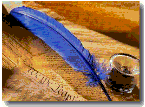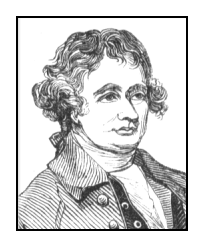
The Declaration of Independence
When in the course of human events . . .
Edmund Burke
Member of Parliament (Britain)
Born: January 12, 1729
Birthplace: Dublin, Ireland
Education: Trinity College, Dublin
Work: Sty. to the Chief Secretary for Ireland, ?-1765; Member of Parliament, 1765
Died: July 9, 1797

Edmond Burke
Edmund Burke, born in Dublin in 1729, was the son of an attorney, Richard Burke. He graduated Dublin's Trinity College and set out to study law in London in 1750. More inclined to literary studies, he gave up law to begin writing. He became a member of a famous literary circle headed by Dr. Samuel Johnson. Burke's essay, The Sublime and Beautiful, led to his appointment as private secretary to the chief Secretary for Ireland, and later to the same post under Premiere, Lord Rockingham. He entered Parliament in 1765 and soon earned a reputation as an aggressive advocate, sympathetic to the state of English citizens and subjects around the world.
Burke sharply criticized misgovernment and corruption at home in such pamphlets as Thoughts on the Cause of the Present Discontents (1770), and On Economical Reform (1780). Though, as a member of Parliament, he was of course suspect, many colonials appreciated Bruce's political philosophy and his sympathies with colonial interests. Essays such as On American Taxation (1774), and On Conciliation with the Colonies (1775), were known and read in educated circles. Burke worked to temper the actions of Parliament and to avert conflict with the colonies but was ultimately unable to do so.
His outlook on the French Revolution was quite different that of the American. His essay, Reflections on the Revolution in France (1790), attacking the overthrow of the French Monarchy and the terrors that followed, inspired Tom Paine to write The Rights of Man (1791). Burke was also active in reform of the terrible abuses perpetrated against the people of India by the British overlords. He caused impeachment proceedings to be brought against the royal Governor of India.
Edmund Burke retired in 1795, but continued to write until his death in 1797. His work had great influence on the western political discourse of the 19th century.
Start page | The Document | Signers | Related Information | Jefferson's Account | Declaration House | Declaration Timeline | Rev. War Timeline | More Resources |





